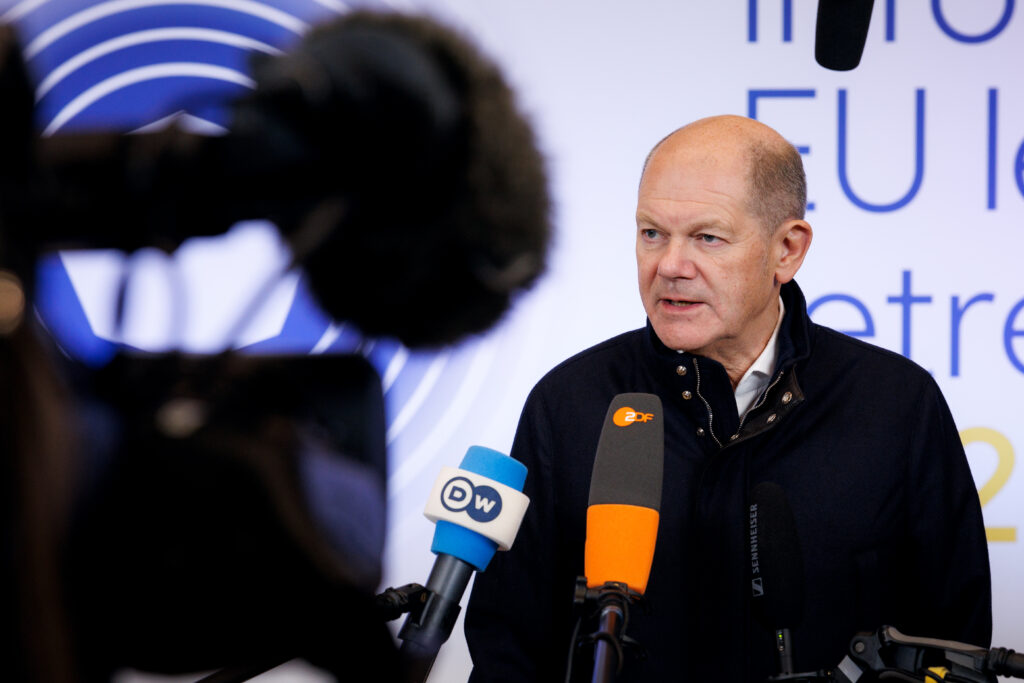Brussels – The road to the chancellery in front of Friedrich Merz may be steeper than expected. The winner of last February’s election is dealing with the internal opposition within the CDU, led by the party’s youth wing, while in the polls, the Christian Democrats are losing ground to the AfD far-right. Above all, the conservative leader is being challenged for opening up too much credit to the Social Democrats, the future partners in government.
The momentous breakthrough (Zeitenwende) sought by Friedrich Merz could cost him dearly. On 18 March, he forced the hand of the Bundestag, getting the outgoing legislature’s deputies to approve the 500-billion-euro maxi-package for Germany’s economic recovery, which included the historic reform of the debt brake (Schuldenbremse) for military spending.
The problem, for Merz, lies in the fact that this constitutional reform represents a U-turn from the traditionally strict positions of the Union (the set of the twin Christian Democratic parties, the Bavarian CDU and CSU) in budgetary matters, opening up to potentially unlimited borrowing. Rigorism that, moreover, the conservative leader himself had defended in the election campaign, being rewarded by the ballot box.
Johannes Winkel, the head of the party’s youth wing (Junge Union), told the German press that “we cannot continue as before” and that the credibility of the chancellor in pectore and the entire Union is in jeopardy, “especially with regard to the key election issues: migration, the economy, cutting red tape.” Winkel, who sits on the CDU board, went so far as to threaten a vote against the coalition agreement with the SPD if it does not contain the conservatives’ identity claims. “If we enter a coalition without the promised and expected policy changes, the country will suffer enormous damage,” he noted.
Some members of the Cologne section of the JU also expressed their disappointment with the future federal chancellor in an open letter: “Mr Merz, we believed in your political leadership,” the missive reads. “We trusted you and fought for you,” the signatories continue, going on to question whether so much effort has been expended “for a CDU that submits to the mainstream left.”

In fact, the negotiations between the future government partners were suspended just yesterday (April 7) to make way for a kind of control room, again between the Union and SPD, dedicated to defining the response to the tariffs imposed by Donald Trump. According to Merz, it is a priority for the negotiations to focus on how to make Germany “regain its competitiveness” in this delicate economic conjuncture after more than two years of economic recession.
The leader of the CDU is in a hurry to relieve Scholz as Bundeskanzler and would like to finalise the coalition agreement by Easter, but it is unclear whether a solution will have been found by then. The most contentious dossiers still need to be opened: migration, taxes and social policies. However, the red-black one is the only possible majority in the new chamber. Unless, of course, it collaborates with the xenophobic and pro-Russian ultra-right of Alternative für Deutschland (AfD), something Merz has already shown he does not disdain in parliament, although he has ruled out wanting to form a government with it.
After all, it was precisely from the party of Alice Weidel and Tino Chrupalla that came yet another insidious threat to the Union. For the first time in the history of the Federal Republic, in the polls, a radical right-wing party has placed itself on par with a mainstream political force at 24 per cent of support. Looking at the aggregate data of various surveys, we see that the Christian Democrats are at most a couple of points ahead of the AfD: a 2-3 percentage point drop from the election results for the former, a parallel growth for the latter—a stinging defeat, if only a virtual one, for Merz’s leadership.





![Un campo coltivato [foto: imagoeconomica]](https://www.eunews.it/wp-content/uploads/2025/04/campo-coltivato-120x86.png)
![[foto: Wikimedia Commons]](https://www.eunews.it/wp-content/uploads/2025/04/alzheimer-120x86.png)